Introduction
Trusting a person or a group means you have an emotional and physical feeling that the individual will prove his credibility and truthful in the assigned task. Trust is built depending on the environment and the relationship that one creates with other individuals. The characteristic of integrity is vital for trust to exist. An individual should strive to do what is right and hold the same value irrespective of the environment. Also, the characteristic of honesty is essential in building trust. It is easy to tell the truth, when honest, and even at the point a friend lie, he can still admit the truth and build a trustworthy environment.
A trustable person is consistent and reliable. It is from this point that one realizes efficient commitment in relationships. Thus, commitment is vital in improving trust between two people or organizations. Additionally, a person's intention is essential in determining the level of trust to be accorded. A trustable person should always have the feeling of care for others at the expense of his desires. Doing so will improve trust with other people is attained and also build the notion of having good intentions towards others. Such that when you do wrong, then the chance of being forgiven is higher. Therefore, I believe that an employer's and employee's relationship success relies on trust.
What should trust look like within a team?
Trust is depicted when team members do their best in the workplace. Team members understand their role in organizations. Trust ensures team members work within the organization's goal and purpose to minimize conflicts and disputes. Also, trust is realized when there is togetherness in service delivery, and this creates efficiency in the workplace.
Moreover, trust is depicted when team members are innovative and take a risk in accomplishing tasks. Team members communicate innovative ideas honestly and openly to the team (Böckler-Raettig, 2017). Thus, ensuring team members got each other's back in service delivery.
In what ways does trust impact the identity of the team?
Trust impacts the identity of a team since it creates an effective workplace relationship. Trust depicts an emotional attachment in team identification, and this ensures that team members understand and perform their roles effectively in the workplace. Trust within team members creates the feeling of being valued by the team members, and this triggers productivity in the workplace. Organizational success is realized when in the encouragement and creation of trust within the team members.
Trust impacts the identity of a team by increasing the level of trust, which in turn improves the commitment level in the workplace. Trust influences the identification of a team by aligning the integrity, benevolence and ability of the team members (Davis, 2014). Trust is achieved by individuals' adherence, skills, and the level of motivation that they get when handling a task. Also, the trust ensures the identification of a team is inclined toward the collective goal instead of individual interest. The act enables team members to work together and equally respond to vulnerabilities effectively. Trust in a team identity improves work quality and achievement of the organization's goals.
Moreover, trust creates interdependent on the identity of a team. An interdependent team is likely to create a difference in the workplace. For instance, team members share innovative ideas, and this plays a vital role in increasing productivity in the organization (Rolfsen, 2016). Additionally, trust impacts on a team identity by encouraging team members not only to trust the team leader but also the team members. Therefore, team members that make decisions in consultation with each other are likely to improve trust in the workplace and create unity in service delivery.
How did Jesus build a balanced team to carry out the Great Commission?
Jesus formed his team by first consulting and conversing with God through prayers on the hilltop. It is from this point that He recruited team members that He thought could help Him finish His mission on salvation. Jesus did not force the disciples to join Him, and instead, they joined willingly. After which Jesus created a team of 12 disciples and gave them a name according to the role they were to play in the ministry. Jesus knew the weakness and qualities of each team leader. Thus, Jesus delegated duties to each disciple based on their capability and strength. After which, Jesus trained his disciple (Team members) with major emphasis on the purpose of the Great Commission. Jesus expected the disciples to work together to preach to the people the message of salvation. Therefore, as a leader, Jesus gave the team members rules that they were to follow to ensure they attain the goal of the Great Commission. Jesus gave each disciple gifts of the Holy Spirit and authorized the team members to serve the living God and gain masses who will, in turn, pursue the Kingdom of Heaven.
References
Böckler-Raettig, A. (2017, January 11). The Psychology of Trust. YouTube. https://www.youtube.com/watch?v=wc3VhvgUtB8
Davis, J. (2014, December 6). Building trust. YouTube. https://www.youtube.com/watch?v=s9FBK4eprmA
Rolfsen D. (2016, May 2). How to start changing an unhealthy work environment. YouTube. https://www.youtube.com/watch?v=eYLb7WUtYt8
Cite this page
Essay Example on Building Trust: Integrity and Honesty Are Key. (2023, Aug 10). Retrieved from https://proessays.net/essays/essay-example-on-building-trust-integrity-and-honesty-are-key
If you are the original author of this essay and no longer wish to have it published on the ProEssays website, please click below to request its removal:
- Delivering Negative News Essay
- Walking on Sunshine: A Rhetorical Analysis Paper Example
- Change Management Consultation Case Analysis Paper Example
- Essay Sample on Safeguarding Tendencies: Adler's Neurotic Lifestyle
- Essay Example on 5 Keys to Social Entrepreneur Success: Lluis Pareras TED Talk
- Essay Example on Women's Leadership in Church: Bible vs Culture
- A Cognitive-Behavioral Program for PTSD in Persons with SMI - Paper Example







